News
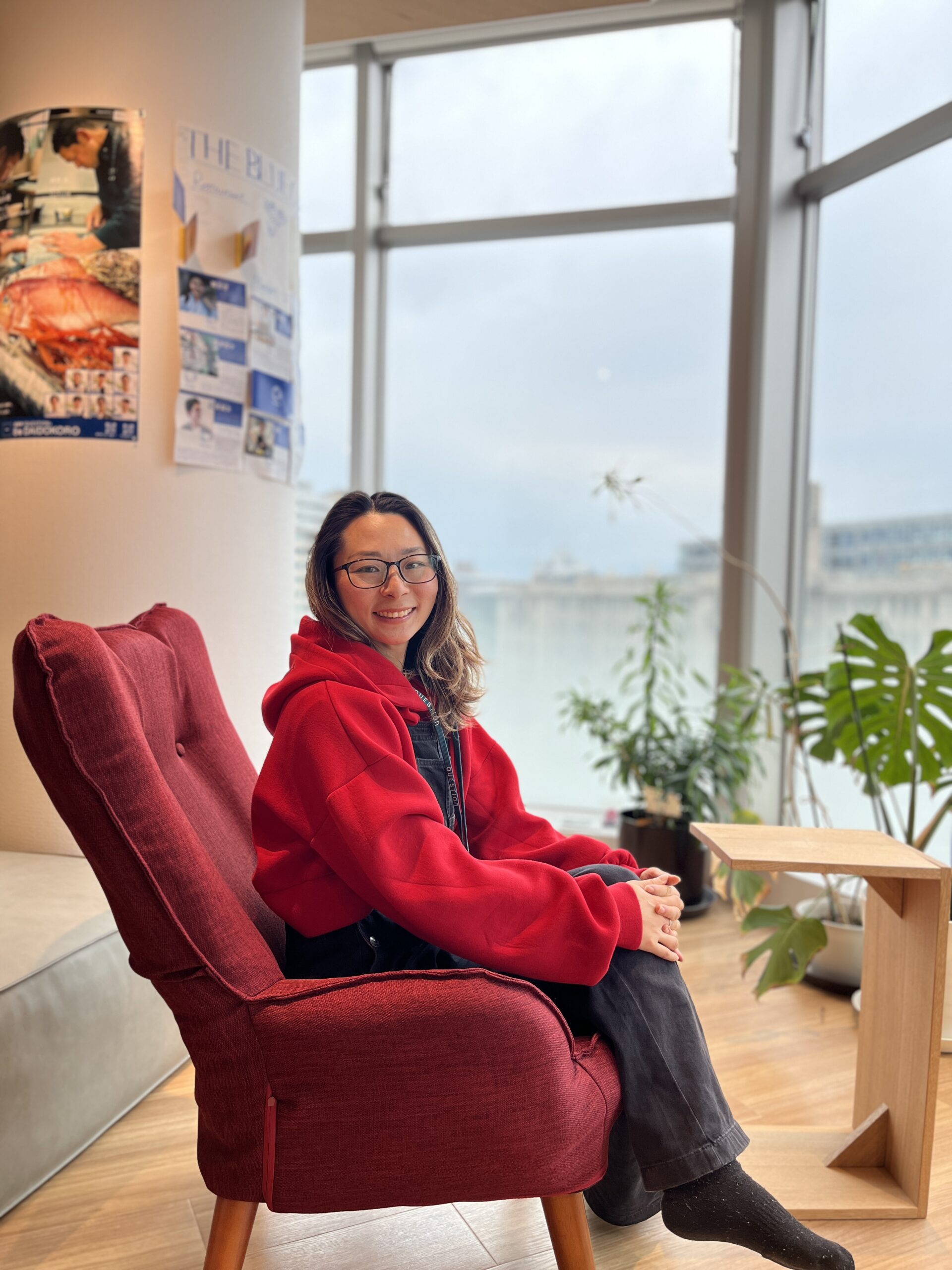
Interview with Michelle Chan (English version below)
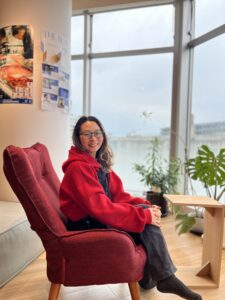
インタビュアー: まずは自己紹介をお願いします。お名前や出身地、ご経歴について教えてください。
Michelle Chan: こんにちは、ミシェル・チャンです。香港で生まれ、オーストラリアで教育を受けました。その後、ロンドンで10年間、公認会計士として働いていましたが、それが自分の理想の仕事ではないと感じ、2014年にヨガ講師に転身しました。現在は、ロンドン、日本、バリ(インドネシア)、香港など、世界各地でヨガの指導を行っています。
インタビュアー: 現在、日本でビジネスを確立しようとされていますが、具体的なプランについて教えてください。
Michelle: 以前は、日本でホテルと提携し、観光客や国内旅行者向けにヨガやマインドフルネスのクラスを提供していました。しかし、近年ヨガの認知度が高まり、スタジオも増えてきました。そこで、私はコミュニティにより深く関わりたいと考えています。
具体的には、企業、病院、学校などに出向いて、ヨガやマインドフルネスを提供する移動型のサービスを展開したいです。スタジオに依存するのではなく、人々の生活圏に直接アプローチし、ヨガをライフスタイルの一部にしてもらうことを目指しています。
企業・学校向けヨガの意義
インタビュアー: 企業や学校にヨガを広めたいという思いには、どのような背景がありますか?
Michelle: 私が最初にヨガを経験したのは、会社が従業員向けに無料で提供していたクラスでした。アメリカやオーストラリア、イギリスでは、ランチタイムにヨガクラスがあるのは一般的ですが、日本ではまだあまり浸透していません。そのため、日本の企業文化に新しい健康習慣を取り入れる良い機会だと考えています。
また、学校においては、イギリスではマインドフルネスの導入が進んでいますが、私はまだ教育機関での指導経験がありません。しかし、特に若い世代にとって、ヨガやマインドフルネスは重要なスキルになると思います。
インタビュアー: 子どもたちにヨガやマインドフルネスを教えることには、どのような可能性があると考えていますか?
Michelle: 近年、多くの人が「学校はもっと実用的なスキルを教えるべきだ」と考えています。例えば、お金の管理や問題解決能力、起業の基礎など。しかし、それと同じくらい、心と身体の健康も重要です。
子どもたちが成長する過程で、深呼吸やストレッチのような基本的なセルフケアスキルを身につけていれば、大人になったときに役立つはずです。特に日本や香港では、若者のストレスやメンタルヘルスの問題が深刻であり、学校でこうしたスキルを学ぶことが、社会全体の健康向上にもつながると信じています。
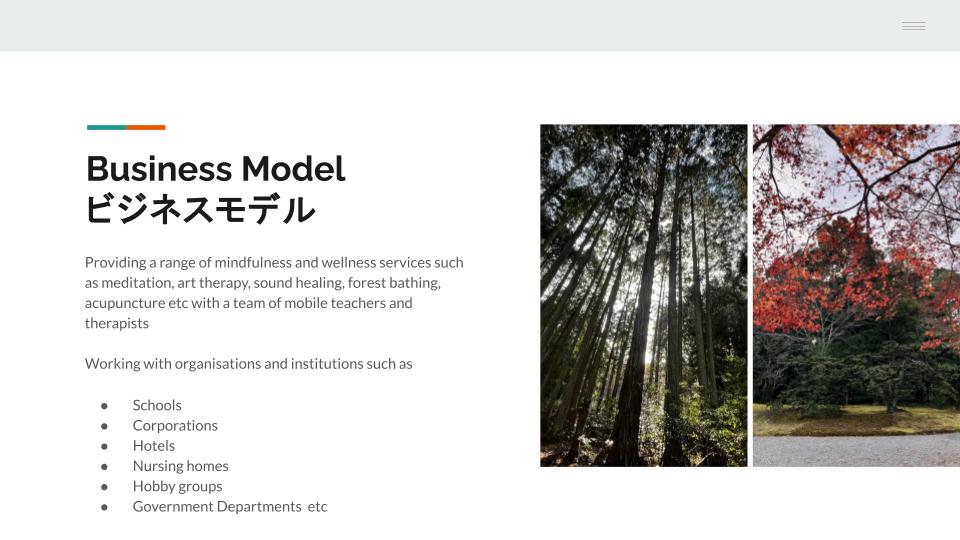
ミシェル・チャンの強み
インタビュアー: ヨガ講師・マインドフルネス指導者としてのあなたの強みは何ですか?
Michelle: 私の最大の強みは、国際的な視点を持っていることです。これまで6カ国に住み、4カ国語を話します。そのため、日本社会に対して、多文化的な視点を提供できるのではないかと思っています。
また、私のヨガクラスでは、単なるフィットネスではなく、マインドフルネスや瞑想にも重点を置いています。「体重を減らす」「美しくなる」といった表面的な目的ではなく、心と体のバランスを整えることに重きを置いている点が、他の講師とは異なる特徴だと思います。
現在の活動と今後の展望
インタビュアー: 現在の活動状況や、今取り組んでいるプロセスについて教えてください。
Michelle: これまでの経験では、新しい場所でのビジネスは自然と広がっていきました。例えば、ホテルやジムと提携すると、口コミで他の仕事が舞い込むようになります。
しかし、日本ではまずビザを取得し、長期的に活動できる基盤を作る必要があります。現在はビザ申請の準備に注力しており、それが整ったら、本格的にクラスの開講やビジネスの展開を始める予定です。
インタビュアー: 京都での活動エリアについては、どのように考えていますか?
Michelle: 京都市内だけでなく、郊外のエリアも視野に入れています。例えば、京北エリアや貴船、京丹波など、自然豊かな場所でのリトリートも考えています。すでにいくつかの候補地をリストアップしており、具体的な計画を立てている段階です。
また、来週は京都のマインドフルネスセンターの関係者と会う予定なので、ネットワークを広げるきっかけになることを期待しています。
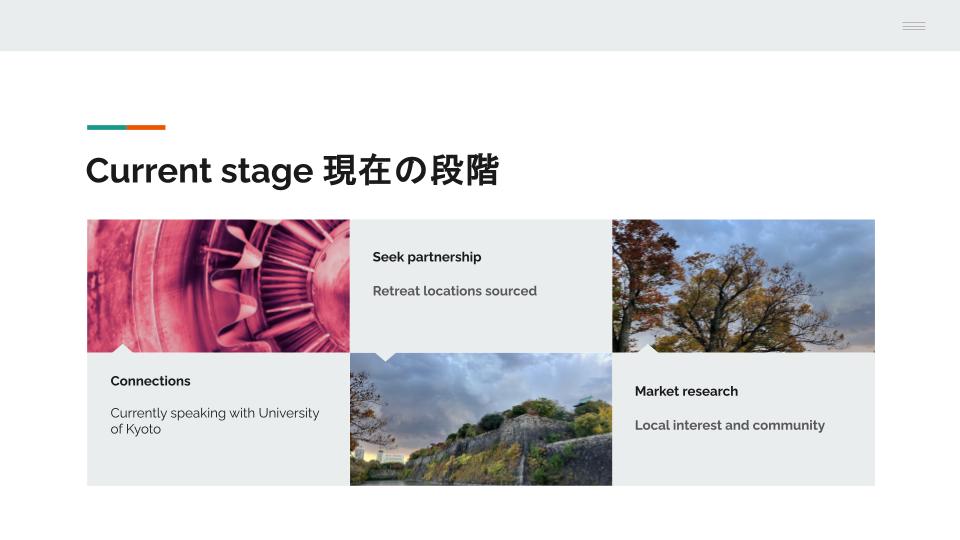
今後の目標
インタビュアー: 90日間のプログラム終了までに、どのような目標を達成したいですか?
Michelle: まずは、確実にビザ申請を進めることが最優先です。今後3〜4ヶ月以内にビザが承認されることを想定し、その間に新たなパートナーを見つけたり、企業や病院にアプローチしたりする予定です。
例えば、病院で無料クラスを提供し、そこから口コミで広げるなどの方法を試みたいと思います。ビザが取得できれば、正式に活動をスタートできるので、それに向けて準備を進めています。
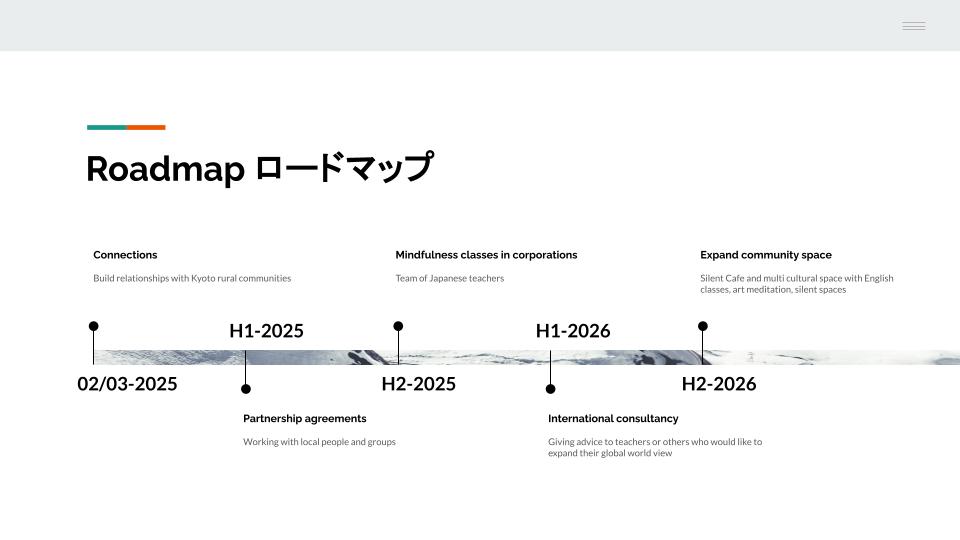
京都での暮らしと魅力
インタビュアー: 京都での生活について、どのように感じていますか?
Michelle: 京都は、自然と文化が豊かで、とても住みやすい街です。東京や大阪に比べると落ち着いていて、私には合っています。特に、地下鉄で座れることが個人的に嬉しいポイントです(笑)。
これまで30回以上日本を訪れていますが、京都に滞在するのは今回が最長です。今後もこの街でキャリアを築けるよう、最適な方法を模索していきたいです。
インタビュアー: ありがとうございました!
90Days Program Participant Interview (Michelle Chan)

Interviewer: First of all, please introduce yourself. Tell us about your name, hometown, and background.
Michelle Chan: Hi, I’m Michelle Chan. I’m born in Hong Kong and educated in Australia. After that, I worked as a Chartered Accountant in London for 10 years, but I felt that it was not my ideal job, so I became a yoga teacher in 2014. Currently, I teach yoga in London, Japan, Bali (Indonesia), Hong Kong, and other parts of the world.
Interviewer: You are currently trying to establish a business in Japan, what are your specific plans?
Michelle: Previously, we partnered with hotels in Japan to offer yoga and mindfulness classes for tourists and domestic travelers. However, in recent years, yoga has become more recognizable and studios have increased. So, I want to be more involved in the community.
Specifically, I would like to develop a mobile service that goes to companies, hospitals, schools, etc. to provide yoga and mindfulness. Rather than relying on studios, we aim to reach out directly to people’s living areas and make yoga a part of their lifestyle.
Significance of Yoga for Businesses and Schools
Interviewer: What is the background behind your desire to promote yoga in companies and schools?
Michelle: My first experience with yoga was in a class that the company offered for free to its employees. In the United States, Australia, and the United Kingdom, it is common to have yoga classes at lunchtime, but in Japan it is not yet very widespread. Therefore, we see this as a good opportunity to incorporate new health habits into Japan’s corporate culture.
Also, in schools, mindfulness is being introduced in the UK, but I have no experience teaching in educational institutions yet. However, I think yoga and mindfulness can be important skills, especially for the younger generation.
Interviewer: What do you see as potential in teaching yoga and mindfulness to children?
Michelle: In recent years, a lot of people have been thinking that schools should teach more practical skills. For example, money management, problem-solving skills, and the basics of starting a business. But just as important is your mental and physical health.
If children develop basic self-care skills like deep breathing and stretching as they grow up, they will be useful when they grow up. Stress and mental health issues among young people are particularly serious in Japan and Hong Kong, and we believe that learning these skills in schools will improve the health of society as a whole.

Michelle Chan’s Strengths
Interviewer: What are your strengths as a yoga teacher and mindfulness teacher?
Michelle: My greatest strength is that I have an international perspective. I have lived in 6 countries and speak 4 languages. Therefore, I think we can provide a multicultural perspective to Japan society.
Also, in my yoga classes, I focus on mindfulness and meditation as well as just fitness. I think that the emphasis on balancing the mind and body, rather than the superficial purpose of “losing weight” or “becoming beautiful”, is a characteristic that sets us apart from other instructors.
Current Activities and Future Prospects
Interviewer: Tell us about your current activities and the process you’re working on.
Michelle: In my experience, doing business in a new location was a natural progression. For example, if you partner with a hotel or gym, word of mouth will bring in other jobs.
However, in Japan, you first need to obtain a visa and create a foundation that allows you to work for a long time. Currently, I am focusing on preparing my visa application, and once that is done, I plan to start offering classes and developing my business in earnest.
Interviewer: What are your thoughts on the area of activity in Kyoto?
Michelle: We’re looking not only at the city of Kyoto, but also at the suburbs. For example, we are thinking of retreating in places rich in nature, such as the Keihoku area, Kifune, and Kyotamba. We have already listed several potential sites and are in the process of making concrete plans.
I’m also planning to meet with people from the Mindfulness Center in Kyoto next week, so I hope it will be an opportunity to expand my network.

Future Goals
Interviewer: What goals do you want to achieve by the end of the 90-day program?
Michelle: First of all, our first priority is to make sure that we are able to proceed with the visa application. We expect our visas to be approved within the next 3-4 months, during which we will find new partners and approach companies and hospitals.
For example, I would like to try to offer free classes at hospitals and spread the word of mouth from there. Once I get my visa, I can officially start my activities, so I am preparing for that.

Life and charm in Kyoto
Interviewer: How do you feel about living in Kyoto?
Michelle: Kyoto is a very comfortable city to live in, rich in nature and culture. Compared to Tokyo and Osaka, it’s calmer and suits me. In particular, I am personally happy to be able to sit on the subway (laughs).
I have visited Japan more than 30 times, but this is the longest time I have stayed in Kyoto. I would like to continue to look for the best way to build a career in this city.
Interviewer: Thank you!


